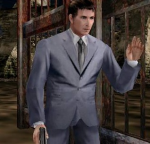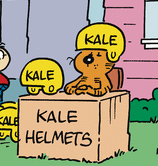|
Mel Mudkiper posted:But, returning to the point, long-form narrative journalism is the abyss in which all failed and mediocre writers shriek for eternity, desperate for relevance It's so obnoxious. This rear end in a top hat writing in second person in a sad attempt to shrug off the fact he's egotistcally beating his chest yelling, "I'm the greatest fanboy!" is just... Journalists who make interviews all about themselves can gently caress right off. This somehow manages to be worse than all those RPO excerpts posted in that other thread: quote:Before flying out to meet David Byrne, prepare. Over-prepare. Actually, if possible, begin preparation unknowingly, in 1989–90, around age 12, by listening to Rei Momo over and over again, in the apartment your dad rents when he and your mom first split up. Leave the CD on repeat, sit at your dad's computer building one SimCity after another, depriving them of vital infrastructural resources and watching them burn down. Form the kind of uncritical attachment to a former frontman's solo stuff that you can only really form as a late-to-the-party 12-year-old. Stuporstar fucked around with this message at 16:55 on Apr 23, 2018 |
|
|
|

|
| # ? Apr 23, 2024 09:18 |
|
Mel Mudkiper posted:Perhaps you could explain why you liked it The percussive rhythm of the phrasing, the imagery it evoked in my mind, the actual content of the thoughts expressed.
|
|
|
|
CountFosco posted:The percussive rhythm of the phrasing, the imagery it evoked in my mind, the actual content of the thoughts expressed. You'll have to explain this. The stress seems fundamentally arrhythmic because the clauses do not mesh together. There is no imagery evoked since all the images are explicit and contextual. As for the thoughts, help me out. I am not sure what the excerpt is supposed to be signifying as meaning, and I tried to read the wiki synopsis but went cross-eyed. Stuporstar posted:It's so obnoxious. This rear end in a top hat writing in second person in a sad attempt to shrug off the fact he's egotistcally beating his chest yelling, "I'm the greatest fanboy!" is just... Journalists who make interviews all about themselves can gently caress right off. This somehow manages to be worse than all those RPO excerpts posted in that other thread: As much as I like his writing, Hunter S Thompson may be the most toxic influence in all of modern arts and letters.
|
|
|
|
This passage from Dumas has stuck with me for awhile.Dumas posted:Isaac knew the temperature of his frames to the twentieth
|
|
|
|
Stuporstar posted:It's so obnoxious. This rear end in a top hat writing in second person in a sad attempt to shrug off the fact he's egotistcally beating his chest yelling, "I'm the greatest fanboy!" is just... Journalists who make interviews all about themselves can gently caress right off. This somehow manages to be worse than all those RPO excerpts posted in that other thread: This old article which is ostensibly about a Rock Band 4 preview event turns into a detestable, and inappropriate attempt at Hunter S. Thompson, gonzo-journalism while he describes how apathetic and disillusioned he is from the games and games press. http://www.polygon.com/2015/6/1/8687867/rock-band-4-preview The thing about narrative journalism being the gaping maw that these self-obstructed writers scream in to is totally apt.
|
|
|
|
please stop talking about so called 'videogame journalism', a fictional and pernicious endeavour, in the prose thread
|
|
|
|
A human heart posted:please stop talking about so called 'videogame journalism', a fictional and pernicious endeavour, in the prose thread It's all they know.
|
|
|
|
I'm going to post Le Guin's most famous short story to wash the unpleasant taste away from the videogame journalism discussion. The Ones Who Walk Away From Omelas by Ursula K. Le Guin With a clamor of bells that set the swallows soaring, the Festival of Summer came to the city Omelas, bright-towered by the sea. The ringing of the boats in harbor sparkled with flags. In the streets between houses with red roofs and painted walls, between old moss-grown gardens and under avenues of trees, past great parks and public buildings, processions moved. Some were decorous: old people in long stiff robes of mauve and gray, grave master workmen, quiet, merry women carrying their babies and chatting as they walked. In other streets the music beat faster, a shimmering of gong and tambourine, and the people went dancing, the procession was a dance. Children dodged in and out, their high calls rising like the swallows' crossing flights over the music and the singing. All the processions wound towards the north side of the city, where on the great water-meadow called the Green Fields boys and girls, naked in the bright air, with mud-stained feet and ankles and long, lithe arms,exercised their restive horses before the race. The horses wore no gear at all but a halter without bit. Their manes were braided with streamers of silver, gold, and green. They flared their nostrils and pranced and boasted to one another; they were vastly excited, the horse being the only animal who has adopted our ceremonies as his own. Far off to the north and west the mountains stood up half encircling Omelas on her bay. The air of morning was so clear that the snow still crowning the Eighteen Peaks burned with white-gold fire across the miles of sunlit air, under the dark blue of the sky. There was just enough wind to make the banners that marked the racecourse snap and flutter now and then. In the silence of the broad green meadows one could hear the music winding throughout the city streets, farther and nearer and ever approaching, a cheerful faint sweetness of the air from time to time trembled and gathered together and broke out into the great joyous clanging of the bells. Joyous! How is one to tell about joy? How describe the citizens of Omelas? They were not simple folk, you see, though they were happy. But we do not say the words of cheer much any more. All smiles have become archaic. Given a description such as this one tends to make certain assumptions. Given a description such as this one tends to look next for the King, mounted on a splendid stallion and surrounded by his noble knights, or perhaps in a golden litter borne by great-muscled slaves. But there was no king. They did not use swords, or keep slaves. They were not barbarians, I do not know the rules and laws of their society, but I suspect that they were singularly few. As they did without monarchy and slavery, so they also got on without the stock exchange, the advertisement, the secret police, and the bomb. Yet I repeat that these were not simple folk, not dulcet shepherds, noble savages, bland utopians. There were not less complex than us. The trouble is that we have a bad habit, encouraged by pedants and sophisticates, of considering happiness as something rather stupid. Only pain is intellectual, only evil interesting. This is the treason of the artist: a refusal to admit the banality of evil and the terrible boredom of pain. If you can't lick 'em, join 'em. If it hurts, repeat it. But to praise despair is to condemn delight, to embrace violence is to lose hold of everything else. We have almost lost hold; we can no longer describe happy man, nor make any celebration of joy. How can I tell you about the people of Omelas? They were not naive and happy children--though their children were, in fact, happy. They were mature, intelligent, passionate adults whose lives were not wretched. O miracle! But I wish I could describe it better. I wish I could convince you. Omelas sounds in my words like a city in a fairy tale, long ago and far away, once upon a time. Perhaps it would be best if you imagined it as your own fancy bids, assuming it will rise to the occasion, for certainly I cannot suit you all. For instance, how about technology? I think that there would be no cars or helicopters in and above the streets; this follows from the fact that the people of Omelas are happy people. Happiness is based on a just discrimination of what is necessary, what is neither necessary nor destructive, and what is destructive. In the middle category, however--that of the unnecessary but undestructive, that of comfort, luxury, exuberance, etc.--they could perfectly well have central heating, subway trains, washing machines, and all kinds of marvelous devices not yet invented here, floating light-sources, fuelless power, a cure for the common cold. Or they could have none of that: it doesn't matter. As you like it. I incline to think that people from towns up and down the coast have been coming to to Omelas during the last days before the Festival on very fast little trains and double-decked trams, and that the trains station of Omelas is actually the handsomest building in town, though plainer than the magnificent Farmers' Market. But even granted trains, I fear that Omelas so far strikes some of you as goody-goody. Smiles, bells, parades, horses, bleh. If so, please add an orgy. If an orgy would help, don't hesitate. Let us not, however, have temples from which issue beautiful nude priests and priestesses already half in ecstasy and ready to copulate with any man or woman, lover or stranger, who desires union with the deep godhead of the blood, although that was my first idea. But really it would be better not to have any temples in Omelas--at least, not manned temples. Religion yes, clergy no. Surely the beautiful nudes can just wander about, offering themselves like divine souffles to the hunger of the needy and the rapture of the flesh. Let them join the processions. Let tambourines be struck above the copulations, and the gory of desire be proclaimed upon the gongs, and (a not unimportant point) let the offspring of these delightful rituals be beloved and looked after by all. One thing I know there is none of in Omelas is guilt. But what else should there be? I thought at first there were no drugs, but that is puritanical. For those who like it, the faint insistent sweetness of drooz may perfume the ways of the city, drooz which first brings a great lightness and brilliance to the mind and limbs, and then after some hours a dreamy languor, and wonderful visions at last of the very arcane and inmost secrets of the Universe, as well as exciting the pleasure of sex beyond all belief; and it is not habit-forming. For more modest tastes I think there ought to be beer. What else, what else belongs in the joyous city? The sense of victory, surely, the celebration of courage. But as we did without clergy, let us do without soldiers. The joy built upon successful slaughter is not the right kind of joy; it will not do; it is fearful and it is trivial. A boundless and generous contentment, a magnanimous triumph felt not against some outer enemy but in communion with the finest and fairest in the souls of all men everywhere and the splendor of the world's summer: This is what swells the hearts of the people of Omelas, and the victory they celebrate is that of life. I don't think many of them need to take drooz. Most of the processions have reached the Green Fields by now. A marvelous smell of cooking goes forth from the red and blue tents of the provisioners. The faces of small children are amiably sticky; in the benign gray beard of a man a couple of crumbs of rich pastry are entangled. The youths and girls have mounted their horses and are beginning to group around the starting line of the course. An old woman, small, fat, and laughing, is passing out flowers from a basket, and tall young men wear her flowers in their shining hair. A child of nine or ten sits at the edge of the crowd alone, playing on a wooden flute. People pause to listen, and they smile, but they do not speak to him, for he never ceases playing and never sees them, his dark eyes wholly rapt in the sweet, thing magic of the tune. He finishes, and slowly lowers his hands holding the wooden flute. As if that little private silence were the signal, all at once a trumpet sounds from the pavilion near the starting line: imperious, melancholy, piercing. The horses rear on their slender legs, and some of them neigh in answer. Sober-faced, the young riders stroke the horses' necks and soothe them, whispering. "Quiet, quiet, there my beauty, my hope..." They begin to form in rank along the starting line. The crowds along the racecourse are like a field of grass and flowers in the wind. The Festival of Summer has begun. Do you believe? Do you accept the festival, the city, the joy? No? Then let me describe one more thing. In a basement under one of the beautiful public buildings of Omelas, or perhaps in the cellar of one of its spacious private homes, there is a room. It has one locked door, and no window. A little light seeps in dustily between cracks in the boards, secondhand from a cobwebbed window somewhere across the cellar. In one corner of the little room a couple of mops, with stiff, clotted, foul-smelling heads, stand near a rusty bucket. The floor is dirt, a little damp to the touch, as cellar dirt usually is. The room is about three paces long and two wide: a mere broom closet or disused tool room. In the room, a child is sitting. It could be a boy or a girl. It looks about six, but actually is nearly ten. It is feeble-minded. Perhaps it was born defective, or perhaps it has become imbecile through fear, malnutrition, and neglect. It picks its nose and occasionally fumbles vaguely with its toes or genitals, as it sits hunched in the corner farthest from the bucket and the two mops. It is afraid of the mops. It finds them horrible. It shuts its eyes, but it knows the mops are still standing there; and the door is locked; and nobody will come. The door is always locked; and nobody ever comes, except that sometimes--the child has no understanding of time or interval--sometimes the door rattles terribly and opens, and a person, or several people, are there. One of them may come in and kick the child to make it stand up. The others never come close, but peer in at it with frightened, disgusted eyes. The food bowl and the water jug are hastily filled, the door is locked; the eyes disappear. The people at the door never say anything, but the child, who has not always lived in the tool room, and can remember sunlight and its mother's voice, sometimes speaks. "I will be good, " it says. "Please let me out. I will be good!" They never answer. The child used to scream for help at night, and cry a good deal, but now it only makes a kind of whining, "eh-haa, eh-haa," and it speaks less and less often. It is so thin there are no calves to its legs; its belly protrudes; it lives on a half-bowl of corn meal and grease a day. It is naked. Its buttocks and thighs are a mass of festered sores, as it sits in its own excrement continually. They all know it is there, all the people of Omelas. Some of them have come to see it, others are content merely to know it is there. They all know that it has to be there. Some of them understand why, and some do not, but they all understand that their happiness, the beauty of their city, the tenderness of their friendships, the health of their children, the wisdom of their scholars, the skill of their makers, even the abundance of their harvest and the kindly weathers of their skies, depend wholly on this child's abominable misery. This is usually explained to children when they are between eight and twelve, whenever they seem capable of understanding; and most of those who come to see the child are young people, though often enough an adult comes, or comes back, to see the child. No matter how well the matter has been explained to them, these young spectators are always shocked and sickened at the sight. They feel disgust, which they had thought themselves superior to. They feel anger, outrage, impotence, despite all the explanations. They would like to do something for the child. But there is nothing they can do. If the child were brought up into the sunlight out of that vile place, if it were cleaned and fed and comforted, that would be a good thing, indeed; but if it were done, in that day and hour all the prosperity and beauty and delight of Omelas would wither and be destroyed. Those are the terms. To exchange all the goodness and grace of every life in Omelas for that single, small improvement: to throw away the happiness of thousands for the chance of happiness of one: that would be to let guilt within the walls indeed. The terms are strict and absolute; there may not even be a kind word spoken to the child. Often the young people go home in tears, or in a tearless rage, when they have seen the child and faced this terrible paradox. They may brood over it for weeks or years. But as time goes on they begin to realize that even if the child could be released, it would not get much good of its freedom: a little vague pleasure of warmth and food, no real doubt, but little more. It is too degraded and imbecile to know any real joy. It has been afraid too long ever to be free of fear. Its habits are too uncouth for it to respond to humane treatment. Indeed, after so long it would probably be wretched without walls about it to protect it, and darkness for its eyes, and its own excrement to sit in. Their tears at the bitter injustice dry when they begin to perceive the terrible justice of reality, and to accept it. Yet it is their tears and anger, the trying of their generosity and the acceptance of their helplessness, which are perhaps the true source of the splendor of their lives. Theirs is no vapid, irresponsible happiness. They know that they, like the child, are not free. They know compassion. It is the existence of the child, and their knowledge of its existence, that makes possible the nobility of their architecture, the poignancy of their music, the profundity of their science. It is because of the child that they are so gentle with children. They know that if the wretched one were not there sniveling in the dark, the other one, the flute-player, could make no joyful music as the young riders line up in their beauty for the race in the sunlight of the first morning of summer. Now do you believe them? Are they not more credible? But there is one more thing to tell, and this is quite incredible. At times one of the adolescent girls or boys who go see the child does not go home to weep or rage, does not, in fact, go home at all. Sometimes also a man or a woman much older falls silent for a day or two, then leaves home. These people go out into the street, and walk down the street alone. They keep walking, and walk straight out of the city of Omelas, through the beautiful gates. They keep walking across the farmlands of Omelas. Each one goes alone, youth or girl, man or woman. Night falls; the traveler must pass down village streets, between the houses with yellow- lit windows, and on out into the darkness of the fields. Each alone, they go west or north, towards the mountains. They go on. They leave Omelas, they walk ahead into the darkness, and they do not come back. The place they go towards is a place even less imaginable to most of us than the city of happiness. I cannot describe it at all. It is possible that it does not exist. But they seem to know where they are going, the ones who walk away from Omelas.
|
|
|
|
This got buried under tinymixtapes chat, and to be fair it's not nearly as awful as any of those, but I just finished reading it today (after having it in a tab on my phone browser for a couple days) and the sheer dopiness of this prose deserves a read. Every metaphor is Jack Handey's Deep Thoughts-caliber. The fact that the author's thesis is basically "murder, it's confusing, huh?" doesn't help.
|
|
|
|
Antivehicular posted:This got buried under tinymixtapes chat, and to be fair it's not nearly as awful as any of those, but I just finished reading it today (after having it in a tab on my phone browser for a couple days) and the sheer dopiness of this prose deserves a read. Every metaphor is Jack Handey's Deep Thoughts-caliber. The fact that the author's thesis is basically "murder, it's confusing, huh?" doesn't help. It's especially funny because a really good literary novel was already written about the case and did a way better job of dealing with the themes of the article
|
|
|
|
kaworu posted:I'm going to post Le Guin's most famous short story to wash the unpleasant taste away from the videogame journalism discussion. i never get the impression reading le guin that she strives for poetry or works hard to beautify her writing (unlike some other authors who put in a huge amount of effort into trying for lyricism and end up with overworked overwrought nonsense, like rothfuss) - she just describes things exactly as they are, and the beauty seems to come naturally
|
|
|
|
this broken hill posted:you did a good thing I know just what you're talking about. I think what it comes down to is like a total lack of pretension in combination with clear literary talent... Of course she also had extremely remarkable parents, both well-known and celebrated anthropologists, each in their own separate right. That almost makes her lack of pretension even more impressive, in a sense, I suppose. I would go so far as to her interest in Taoism is actually very reflective of this. I don't know how many of you have read the Tao Te Ching - but pick a good translation, the original poems are extremely idiomatic by nature, which makes a subtler point about Le Guin's lack of pretension. The very first lines of the Tao te Ching literally reads (uh, more or less) "If you have to put the Tao into words, then it is not the General Tao". The General Tao meaning the abstract sense of the Tao. So right there, at the heart of her belief system, was a lesson in humility for writers and truth-seekers alike. And I know, this whole paragraph is a pretentious mess But in truth, I do think there's something to that.
|
|
|
|
I read that story now and, uhh, guys, chill out. It wasn't horrible but felt like a totally artless and bloated take on Invisible Cities. Nothing about the prose stood out, except for the genre affect of throwing in confusing made up nouns just for the sake of it, which I hate
|
|
|
|
Ras Het posted:Here's a bit from Dead Souls (via Robert A Maguire) that I like:  Edit: Also getting the previous Penguin edition, translated by Magarshack. Sham bam bamina! fucked around with this message at 07:26 on Apr 30, 2018 |
|
|
|
I really like Magatshack, though I've not done much comparison with others.
|
|
|
|
Mr. Squishy posted:I really like Magatshack, though I've not done much comparison with others. Sham bam bamina! fucked around with this message at 09:49 on Apr 30, 2018 |
|
|
|
I thought a lot of Magarshack translations were revisions of Constance Garnett, or am I thinking of someone else?
|
|
|
|
Magarshack's work was his own, and revisions are always explicitly credited as such regardless. I know that Matlaw revised Garnett's The Brothers Karamazov. There's an unreasonable amount of "M" names in Russian translation; maybe that's where you're getting tripped up. Sham bam bamina! fucked around with this message at 11:16 on Apr 30, 2018 |
|
|
|
Recently I've been reading Gottfried Benn, who I'm not sure I fully 'get', but his prose looks like this:quote:A trivial occasion, a purely personally motivated line of thought--yet the experience induced me to take a closer look at my companion, this gentleman at the peak of his era, the leader of broad strata, the carrier of the positive idea, the causal-genetic thinker. I saw him before me with his instruments, his otoscope, his pincers, germ-free and nickel-plated--way behind him lay the Moorish epoch, the age of the herniotomists and lithotomists, the Galenic darkness, the mysticism of the mandrake. I envisioned his hospital, spick and span, a very different thing from the herb gardens and distilleries of the medieval urine watchers. Tangibly his sonorous and voluminous voice enveloped me in its suggestive and hypnotic charm, completely dislodging the memory of those spells and incantations of the Cimbrian priestesses I had been reading about, who practiced their so-called healing art in white linen garments girt with a bronze belt. […]
|
|
|
|
quote:Invited to the private view, he was clean-shaven and his hair brushed but not over-brushed, the nonchalance of his hairstyle a style but nonetheless not an affectation, knowing as the pianist did the difference between style and affectation not only in the artistry of his playing, in particular, but also in his art of life, in general, the art of living with hair at ease and the art of playing with moderate pedal-usage, was driving on those still-chaotic roads and through the relatively medieval countryside, that smooth, masterful driving, not overusing the pedals, as the driver so the pianist, both gauging their pedalling just right, I gauge admirably the pianist was thinking traversing fields and woods, gauging away, driving towards the cultural castle, he was not going to the private view for private viewing but intending to see the show without ulterior motive, had heard about the exhibition long before receiving the invitation, had received the invitation but long before receiving it already decided to visit the Brandenburgian castle of Neuhardenberg, was regardless of the invitation au fait with the music of the Third Reich, had practically no expectations of the private view, expected neither primary nor secondary benefits, had never expected more of private views than that he would not linger over them but he did have expectations of the exhibition; from the private view of course he would gain nothing more than the grease of hands shaken and presentations on autopilot but from the exhibition something, an affirmation, why not even a discovery, had indeed discovered Schoenberg’s Blue Self-Portrait, seen the majority of Schoenberg’s paintings, got to know the musician and also the painter. Most composers know nothing of Schoenberg’s approach to painting nor do most painters know much about his style of composition. The pianist had seen most of the self-portraits, yet had never before seen the Blue Self-Portrait, so stopped before that blue, felt the anxiety and chill, the awareness of time and negative space folding into itself, sought some affirmation that he knew would be pointless, bent over the case that held Schoenberg’s letter. He had peered at the letter and read it three or four times from the bottom up, starting with the signature which he knew and recognised, it was a humdrum letter to the Reich’s culture minister, Schoenberg pleading with the culture minister to recognise his music’s value to the nation, imploring one last time but too late, had in reality already said gently caress off to the Nazis, gently caress off face-to-face, Scheisse! Schoenberg’s face versus the Nazis’ face – that Schoenberg had balls the pianist reflected as indeed he did every time he thought about Schoenberg, thought to himself while standing there facing the Blue Self-Portrait, to have balls or not to have them, the blue’s affront to the radiant sky and its chortling countryside, Scheisse to the Nazis long before they were marching through Munich. Look at that look, thought the pianist, anti-Nazi the look and anti-Nazi the portrait’s blue, Schoenberg’s expression promised nothing positive for the art of the future, conveyed an anxiety for the future, looked far beyond any definition of the work of art or of the future; the pianist weighed Schoenberg’s solitude and Schoenberg’s solitary conscience flaunted in advance: an insult to the national-socialist ethic, and it was with the pure, burning joy of having deepened his conscience, as pianist both composer and musician, thanks to this proof of Schoenberg’s courage as a painter displayed in the Neuhardenberg castle, that the pianist got in his car and drove back to Berlin, his heart punching his ribs, that he found, perhaps precisely in his own little car, puttering along the zoned-out roads of the Brandenburg countryside, a sparkling new, completely original and perfectly formed line of music, shaping there at the wheel and in anticipation the perfection of man in his time and man in the idea. The idea is indeed beautiful but it’s nothing without time and time is nothing without the idea; as a musician he had a sense of time as tempo, driving around in the pre-Polish countryside, the sense of this musical idea in time, dazzled by his insight, perceived the limits of his idea outside time, had to stop the car in order to get his brand-new melody down on paper, sitting in his car pulled over on the hard shoulder, right there he wrote down the melody. Thinking back to the pianist’s car made me feel sick, my knees went weak and my head was burning, I could have passed it off as airsickness but really it was shame, plain and simple, and by association of shames I recalled driving the pianist-composer-driver right round the bend by making him go up and down Neue Kanstrasse three times because I could no longer find the entrance to my Polish hostel, and my shameometer measured a new record with that devastating memory, my soles were damp, my temples throbbing and my eyes squeezed shut in aged penitent-nun style – which comes straight from my education – remembering the pianist’s exasperation after the third of our three back-and-forths, his deep sigh, his ever more visible and ever less restrained impatience for us to be done, um Gottes Willen, by the grace of God Schluss! Will this never end! I heard him, the irritation in his gritted teeth, I burned with shame as I pictured once more the pianist’s hands clamped rigid on the wheel, the pianist’s exasperation you had to see his clenched jaw, the pianist was wondering given apparent circumstances and who could blame him when this interminable evening would be over and at what hour he might finally go home to bed not to dream but to sleep that peaceful, silent, restorative sleep without visions that would allow him to hope for a new day just like all the other new days required for the equilibrium of a pianist-composer, a new day shaped by the essential practice that the pianist relied on to play the piano and the composer to compose.
|
|
|
|
A human heart posted:Recently I've been reading Gottfried Benn, who I'm not sure I fully 'get', but his prose looks like this: What work is this from?
|
|
|
|
Is this Bernhard? Maybe from the loser or Wittgenstein's Nephew? It's some good rear end poo poo, anyway. It reminded me a little bit of Alex Ross' history of twentieth century classical music, where in one of the chapters he talks about how avant garde composers viewed their music as a repudiation of totalitarianism, since the big euro fascist parties all rejected major advances in harmony, like in the music Schoenberg was writing. If I remember, Bernhard studied at the Mozarteum in Salzburg. When he writes about music it's dope.
|
|
|
|
david crosby posted:Is this Bernhard? Maybe from the loser or Wittgenstein's Nephew? It's some good rear end poo poo, anyway. It reminded me a little bit of Alex Ross' history of twentieth century classical music, where in one of the chapters he talks about how avant garde composers viewed their music as a repudiation of totalitarianism, since the big euro fascist parties all rejected major advances in harmony, like in the music Schoenberg was writing. Thought it might appeal to some. It's Blue Self-Portrait by Noemi Lefevbre. While certainly music and art generally are part of it, the narrators relationship to her sister and the pianist mentioned play a large part as well. Largely she (overexamines) her relationships and art and music in long digressive sentences and paragraphs. She seizes on various ideas, authors, and places and remixes them endlessly in a sort of energetic, neurotic stream of consciousness. A longer excerpt is here.
|
|
|
|
Franchescanado posted:What work is this from? It's from a piece called 'Primal Vision', and I read it in a collection called 'Primal Vision: selected poetry and prose' which I think might still be in print from New Directions. I don't think any of his longer prose works have been translated fully, there's that collection and maybe one or two others available though.
|
|
|
|
A human heart posted:It's from a piece called 'Primal Vision', and I read it in a collection called 'Primal Vision: selected poetry and prose' which I think might still be in print from New Directions. I don't think any of his longer prose works have been translated fully, there's that collection and maybe one or two others available though. It's very cool, thank you. I like the dense styles of prose you've posted.
|
|
|
|
While I'd have to post multiple passages to get across the effect, I think Lev Grossman writes prose that manages to tell without being boring. Any modern novel that has 7 straight paragraphs of backstory with no dialogue interspersed would normally put my teeth on edge but he manages to include enough vivid imagery to sketch out mini-scenes before blending into the next bit of backstory. Then, when you've just about had enough, he'll transition to an actual scene with dialogue. Not groundbreaking stuff but it makes for a very pleasant reading experience. Other authors who can't pull of this pacing trick end up writing hundreds of unnecessary pages.
|
|
|
kaworu posted:I know just what you're talking about. I think what it comes down to is like a total lack of pretension in combination with clear literary talent... Of course she also had extremely remarkable parents, both well-known and celebrated anthropologists, each in their own separate right. That almost makes her lack of pretension even more impressive, in a sense, I suppose. LeGuin did her own translation of the Tao The Ching.
|
|
|
|
|
If youre not reading the Aleister Crowley dao de jing then idk what to tell you
|
|
|
|
Try "Read Aleister Crowley's translation of the Dao De Jing you imbecile".
|
|
|
|
Ccs posted:While I'd have to post multiple passages to get across the effect, I think Lev Grossman writes prose that manages to tell without being boring. Any modern novel that has 7 straight paragraphs of backstory with no dialogue interspersed would normally put my teeth on edge but he manages to include enough vivid imagery to sketch out mini-scenes before blending into the next bit of backstory. Then, when you've just about had enough, he'll transition to an actual scene with dialogue. I'm guessing that his prose, is bad
|
|
|
|
Vivid is my favorite kind of imagery.
|
|
|
|
Sham bam bamina! posted:Vivid is my favorite kind of imagery. If only we had some way to categorize how vivid the imagery was
|
|
|
|
CestMoi posted:If youre not reading the Aleister Crowley dao de jing then idk what to tell you I still run into people who think that Thelemites lady actually hosed a goat. Why does anyone believe what that man wrote? Sham bam bamina! posted:Vivid is my favorite kind of imagery. I prefer dull and morose imagery personally. I won't get out of bed for anything more exciting than the written equivalent of a 70 year old frittering away her retirement on a slot machine. Hate Fibration fucked around with this message at 21:02 on Aug 3, 2018 |
|
|
|
I just read this thing called The Terrors of the Night by an old timey man called Thomas Nashe, and it's got some wonderful prosequote:What do we talk of one devil? There is not a room in any man’s house but is pestered and close packed with a camp-royal of devils. Chrysostom saith the air and earth are three parts inhabited with spirits. Hereunto the philosopher alluded when he said nature made no voids in the whole universal, for no place (be it no bigger than a pock-hole in a man’s face) but is close thronged with them. Infinite millions of them will hang swarming about a worm-eaten nose.
|
|
|
|
There is a sex scene in Trick Baby by Iceberg Slim where he describes cunnilingus as sucking the magical gnome off a buried toadstool.
|
|
|
|
The Countess's breasts, which were lightly veiled by a translucid gauze, were devoured by the charmed eyes of a young man, who could, in the silence of the night, hear the murmur of these ivory globes
|
|
|
|
William Gibson's "late Era" style can occasionally veer too close to "he did this, he said that" (Virtual Light) but by All Tomorrow's Parties it's poetically sparse. Love me the hell out of 2 page chapters that give more of a sense of place than 100 pages of Tolkien rambling
|
|
|
|
Ahhh, the swamp of Amazon's self-publishing marketplace... quote:
1) Holy poo poo that's a long first sentence. 2) My God, the protagonist is called "Noir". 3) Why is he "trying his hardest not to look like a rock star" in the privacy of his own apartment? 3a) If he wants to not look like a rock star, why does he have tattooed eyeliner? 3b) How wide is "three-pixels" in real-world measurements? 4) "Irrationally" long lashes? 4a) Holy poo poo they touch his cheeks, they must be literally an inch long.
|
|
|
|
pretty badass grabbing your shoes in one movement with closed eyes and no commas though
|
|
|
|

|
| # ? Apr 23, 2024 09:18 |
|
God Of Paradise posted:There is a sex scene in Trick Baby by Iceberg Slim where he describes cunnilingus as sucking the magical gnome off a buried toadstool. Iceberg Slim ftw
|
|
|
































